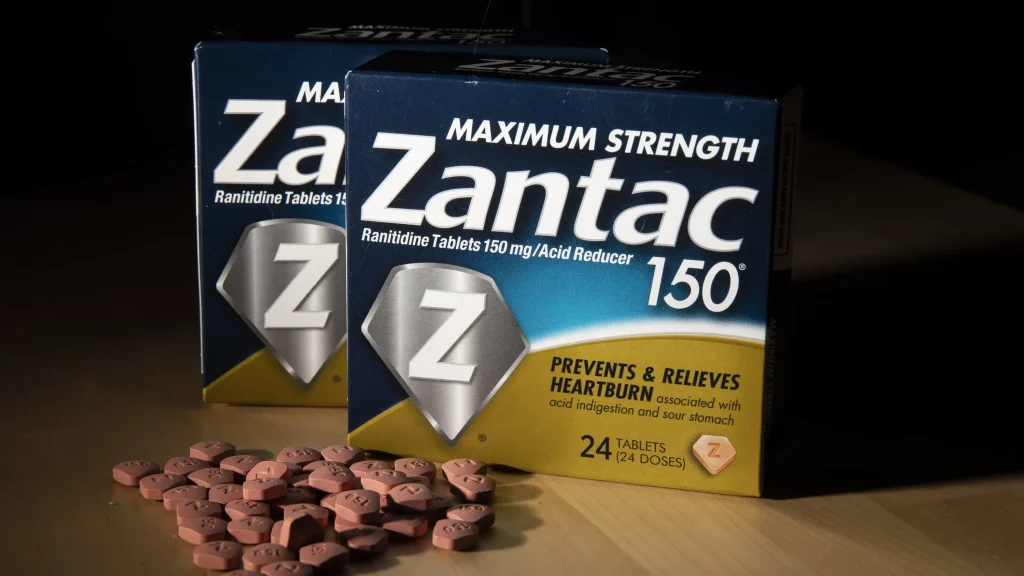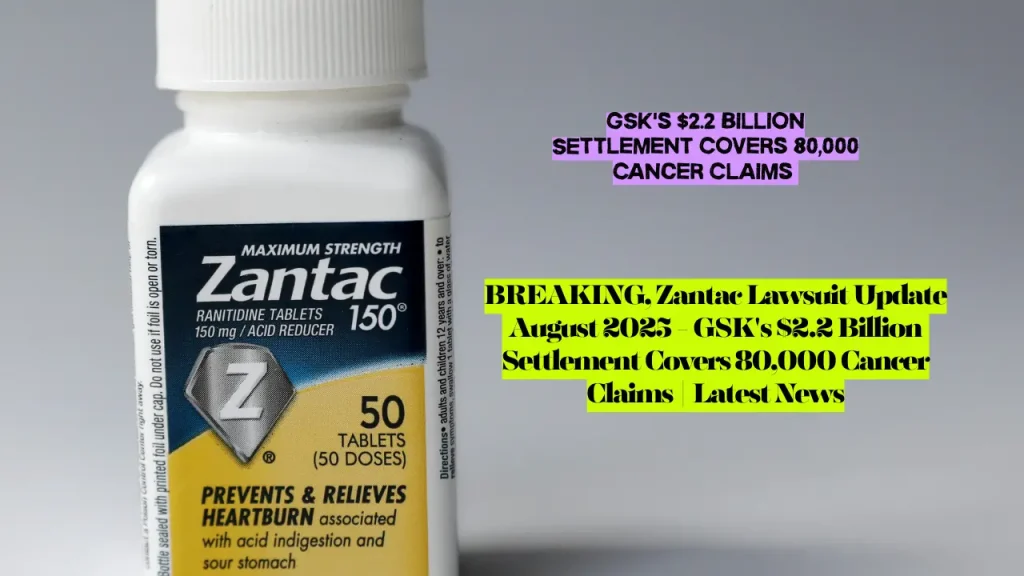Zantac Lawsuit Update August 2025 – GSK’s $2.2 Billion Settlement Covers 80,000 Cancer Claims
If you or a loved one took Zantac (ranitidine) and later developed cancer, you may be entitled to significant compensation from a historic $2.2 billion settlement. This comprehensive guide breaks down everything you need to know about the Zantac lawsuit, from health risks to settlement amounts.
The Zantac litigation represents one of the largest pharmaceutical settlements in recent history, affecting hundreds of thousands of people who used this once-popular heartburn medication.
What Is the Zantac Lawsuit About?
The Zantac lawsuit centers on allegations that the popular heartburn medication contained dangerous levels of NDMA (N-nitrosodimethylamine), a probable human carcinogen. NDMA is classified as a probable human carcinogen (a substance that could cause cancer) based on results from laboratory tests.
Thousands of people who regularly used Zantac developed various types of cancer, leading to mass litigation against the drug’s manufacturers, including GlaxoSmithKline (GSK), Sanofi, Pfizer, and Boehringer Ingelheim.
The core allegations include:
- Manufacturers knew or should have known about NDMA contamination
- Companies failed to warn consumers about cancer risks
- Defective manufacturing processes led to dangerous NDMA levels
- Inadequate testing and quality control measures
Table of Contents
Historic $2.2 Billion Settlement Reached
GlaxoSmithKline has reached private settlement agreements covering approximately 80,000 Zantac lawsuits, which account for the vast majority of cases pending in Delaware Superior Court. These settlements, estimated to total up to $2.2 billion, represent a major victory for affected individuals.
Key Settlement Details:
Settlement Amount: Up to $2.2 billion Cases Covered: Approximately 80,000 lawsuits Coverage: GSK has said these settlements will pay 93% of existing plaintiffs Timeline: The participating plaintiff firms are unanimously recommending to their clients that they accept the terms of the State Courts Settlement, which is expected to be fully implemented by the end of H1 2025
This settlement resolves the majority of state court cases, though some federal and individual cases may continue.
Understanding NDMA and Cancer Risks
What Is NDMA?
NDMA is a chemical compound that has been linked to serious health risks. N-nitrosodimethylamine (NDMA) is a chemical shown to induce tumor formation in the gastrointestinal tract, liver, lungs, and kidneys in animals.
How NDMA Affects Your Health
Genotoxic substances such as NDMA may increase the risk of cancer if people are exposed to them above acceptable levels and over long periods of time, which is exactly what happened with regular Zantac use.
The FDA’s investigation revealed that sustained higher levels of exposure may increase the risk of cancer in humans, leading to the complete removal of ranitidine products from the market.
Types of Cancer Linked to Zantac
Research has connected Zantac use to several types of cancer:
Gastrointestinal Cancers:
- Stomach cancer
- Colorectal cancer
- Intestinal cancer
Other Cancer Types:
- Liver cancer
- Kidney cancer
- Bladder cancer
- Lung cancer
- Pancreatic cancer
- Prostate cancer
Who Is Eligible for Zantac Settlement Claims?
You may be eligible for compensation if you meet these criteria:
Primary Eligibility Requirements:
- Zantac Usage: You regularly used Zantac (ranitidine) for an extended period
- Cancer Diagnosis: You developed cancer after using Zantac
- Timeline: Your cancer diagnosis came after starting Zantac use
- Medical Records: You have documentation of both Zantac use and cancer diagnosis
Factors That Strengthen Your Case:
- Long-term use: Regular Zantac use for months or years
- High dosage: Taking prescription-strength or frequent over-the-counter doses
- Early diagnosis: Cancer developed within a reasonable timeframe after use
- Medical documentation: Clear records linking your condition to potential NDMA exposure
Related Lawsuit: Celtic Sea Salt Lawsuit RESOLVED, Get Your Settlement Money Before It’s Too Late

How Much Compensation Can You Receive?
While settlement terms remain confidential, compensation typically depends on several factors:
Factors Affecting Settlement Amounts:
Severity of Illness:
- Type of cancer diagnosed
- Stage at diagnosis
- Treatment required
- Long-term prognosis
Economic Damages:
- Medical expenses (past and future)
- Lost wages and earning capacity
- Rehabilitation costs
- Ongoing care needs
Personal Factors:
- Age at diagnosis
- Duration of Zantac use
- Impact on quality of life
- Pain and suffering
Estimated Settlement Ranges:
Based on similar pharmaceutical settlements, individual payouts may range from:
- Minor cases: $10,000 – $50,000
- Moderate cases: $50,000 – $250,000
- Severe cases: $250,000 – $1,000,000+
Note: These are estimates based on similar cases. Actual settlement amounts depend on individual circumstances.
How to File Your Zantac Claim
Step 1: Gather Your Documentation
Collect essential records including:
- Medical records showing cancer diagnosis
- Pharmacy records or receipts proving Zantac purchases
- Employment records (for lost wage claims)
- Insurance documentation
- Any correspondence with healthcare providers
Step 2: Establish the Connection
Work with qualified attorneys to establish the link between your Zantac use and cancer diagnosis. This involves:
- Medical timeline analysis
- Expert medical opinions
- Documentation review
- Case strength evaluation
Step 3: Legal Representation
Choose experienced pharmaceutical litigation attorneys who:
- Handle Zantac cases specifically
- Have a track record with mass tort litigation
- Offer free consultations
- Work on contingency fee basis
Step 4: File Your Claim
Your attorney will:
- Submit your case to the appropriate court
- Negotiate with defendant companies
- Present evidence supporting your claim
- Work toward fair settlement or trial verdict
Important Deadlines and Time Limits
Statute of Limitations Concerns:
Each state has different time limits for filing lawsuit claims. Generally:
- Discovery Rule: Time limit starts when you discovered or should have discovered the connection between Zantac and your cancer
- Typical Timeframes: 2-4 years from discovery, varying by state
- Settlement Deadlines: Current settlement negotiations have specific acceptance deadlines
Critical: Don’t wait to explore your legal options. Deadlines vary by jurisdiction and individual circumstances.
Related lawsuit: Depo Provera Lawsuit Settlement Could Pay Women Up to $1 Million for Brain Tumors

Current Status of Zantac Litigation
Recent Legal Developments:
State Court Progress: A significant development in the Zantac MDL occurred in June 2024, when a Delaware state court judge ruled that Zantac lawsuits could proceed to jury trials
Federal vs. State Courts: As a result of this court ruling in Delaware, the focus of Zantac litigation is gradually shifting from the federal MDL to state courts
Ongoing Cases: While the majority of cases are included in the GSK settlement, some litigation continues against other manufacturers and in federal court.
Why Choose Legal Action?
Benefits of Pursuing Your Claim:
Financial Recovery:
- Compensation for medical expenses
- Lost income replacement
- Future care cost coverage
- Pain and suffering damages
Corporate Accountability:
- Hold manufacturers responsible for dangerous products
- Support stronger safety regulations
- Prevent similar incidents in the future
Peace of Mind:
- Professional legal representation
- No upfront costs with contingency fees
- Access to medical experts and resources
FDA Actions and Market Removal
On Sept. 13, 2019, the FDA warned that some ranitidine medicines, including Zantac, contain low levels of NDMA, a probable human carcinogen. This warning ultimately led to the complete removal of all ranitidine products from the market.
The FDA’s investigation revealed that NDMA levels could increase during storage and under certain conditions, creating even greater health risks for consumers.
Frequently Asked Questions (FAQ)
Q: Do I have a case if I used generic ranitidine instead of brand-name Zantac?
A: Yes, the lawsuit covers all ranitidine products, including generic versions. The NDMA contamination issue affected the active ingredient itself, not just specific brand formulations.
Q: What if I can’t prove exactly how long I used Zantac?
A: While documentation helps, attorneys can work with available evidence including pharmacy records, medical histories, and testimony from family members to establish usage patterns.
Q: Can family members file claims for deceased loved ones?
A: Yes, wrongful death claims may be filed by surviving family members if a loved one died from cancer potentially linked to Zantac use.
Q: How long will it take to receive settlement money?
A: For plaintiffs who accept the settlement offer, they may begin receiving payments as early as the settlement implementation phase, expected by mid-2025.
Q: What if I developed cancer but also have other risk factors?
A: Having other risk factors doesn’t automatically disqualify your claim. Attorneys and medical experts can help establish whether Zantac contributed to your cancer development.
Q: Are there any costs to pursue a Zantac claim?
A: Most attorneys handling these cases work on contingency, meaning you pay no fees unless you receive compensation.
Q: What types of evidence strengthen my case?
A: Strong evidence includes medical records, pharmacy receipts, prescription history, witness testimony about your Zantac use, and expert medical opinions linking your cancer to NDMA exposure.
Q: Can I still file a claim if I used Zantac many years ago?
A: Potentially yes, depending on when you were diagnosed with cancer and your state’s statute of limitations. The discovery rule often applies, starting the clock when you learned about the potential connection.
Q: What if multiple manufacturers made the Zantac I used?
A: Your attorney can help identify all responsible parties and pursue claims against multiple manufacturers if necessary.
Q: How do attorneys prove NDMA caused my specific cancer?
A: Legal teams use medical experts, scientific studies, timing analysis, and elimination of other causes to build compelling causation arguments.
Next Steps: Protecting Your Rights
Immediate Actions to Take:
- Consult qualified legal counsel experienced in pharmaceutical litigation
- Gather all relevant medical and pharmacy records
- Document your Zantac usage history as completely as possible
- Don’t delay due to statute of limitations concerns
- Avoid settling directly with manufacturers without legal representation
What to Expect During the Process:
Initial Consultation: Free case evaluation with experienced attorneys Case Investigation: Thorough review of medical records and usage history Filing Process: Formal submission of your claim Settlement Negotiation: Professional representation in settlement discussions Resolution: Fair compensation for your damages and losses
Conclusion: Your Path to Justice and Compensation
The Zantac lawsuit represents a critical opportunity for affected individuals to receive compensation for serious health impacts caused by NDMA contamination. GlaxoSmithKline has reached private settlement agreements covering approximately 80,000 Zantac lawsuits, providing a clear path to recovery for most affected individuals.
If you or a loved one used Zantac and later developed cancer, don’t wait to explore your legal options. The combination of a historic settlement fund, experienced legal representation, and strong scientific evidence supporting NDMA-cancer connections creates a favorable environment for compensation recovery.
Time is critical in these cases due to statute of limitations concerns and settlement acceptance deadlines. Contact qualified pharmaceutical litigation attorneys today to protect your rights and explore your compensation options.
Remember: You deserve justice and compensation for the harm caused by defective pharmaceutical products. The legal system provides a pathway to hold manufacturers accountable while securing the financial resources you need for recovery and future care.
This article is for informational purposes only and does not constitute legal advice. Consult with qualified attorneys for guidance specific to your situation. Settlement amounts and eligibility requirements may vary based on individual circumstances and jurisdictional differences.
About the Author

Sarah Klein, JD, is a licensed attorney and legal content strategist with over 12 years of experience across civil, criminal, family, and regulatory law. At All About Lawyer, she covers a wide range of legal topics — from high-profile lawsuits and courtroom stories to state traffic laws and everyday legal questions — all with a focus on accuracy, clarity, and public understanding.
Her writing blends real legal insight with plain-English explanations, helping readers stay informed and legally aware.
Read more about Sarah
